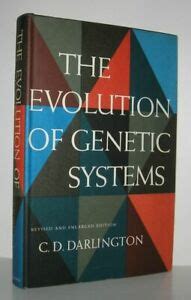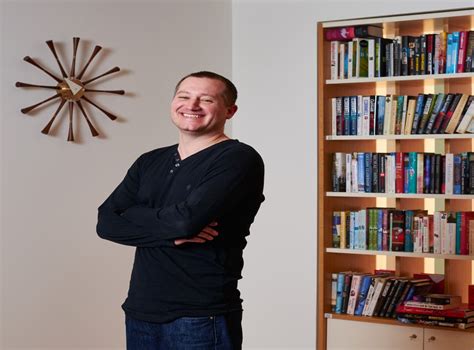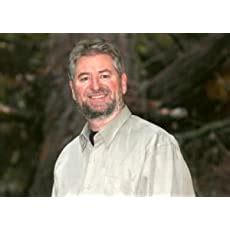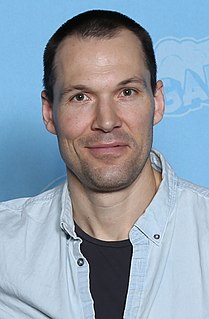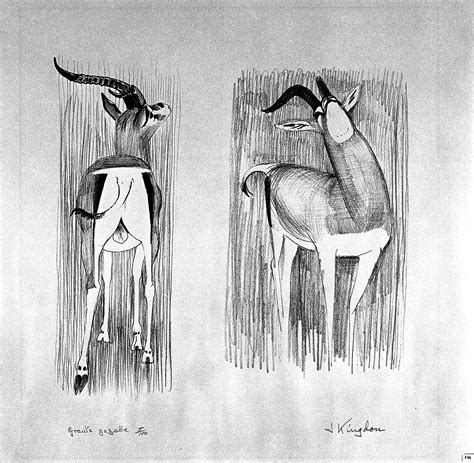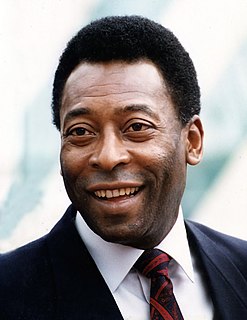Top 221 Genetics Quotes & Sayings - Page 4
Explore popular Genetics quotes.
Last updated on April 15, 2025.
What has happened is that genetics has become a branch of information technology. It is pure information. It's digital information. It's precisely the kind of information that can be translated digit for digit, byte for byte, into any other kind of information and then translated back again. This is a major revolution. I suppose it's probably "the" major revolution in the whole history of our understanding of ourselves. It's something would have boggled the mind of Darwin, and Darwin would have loved it, I'm absolutely sure.
Cell genetics led us to investigate cell mechanics. Cell mechanics now compels us to infer the structures underlying it. In seeking the mechanism of heredity and variation we are thus discovering the molecular basis of growth and reproduction. The theory of the cell revealed the unity of living processes; the study of the cell is beginning to reveal their physical foundations.
Molecular genetics can show off some surprising relationships like, for example, the close relationship of whales to hippopotamuses, which I think nobody ever guessed until molecular data was looked at. The closest relatives of whales are hippopotamuses, even closer than any other cloven-hoofed animals.
(After meeting her birth mother after more than 40 years) We exchange bunches of orchids, laughing at the coincidence of the flowers. A little unnerving: I wonder if that choice has anything to do with genetics. ... I want to take mine home and look after them so that they live for days. I might spray the leaves, and make sure they sit in an easterly window, and keep them out of the direct sun.
You'd think family would be the one sure thing in life, the gimme? Points you got just for being born? So much thick, meaty stuff bound you to these people, so many interlocking spirals of history, genetics, common cause, and struggle that it should be the most basic of all drives, that you would strive to protect and love one another, yet this bond that should be the big no-brainer was in fact the hardest thing.
A man with a talent does what is expected of him, makes his way, constructs, is an engineer, a composer, a builder of bridges. It's the natural order of things that he construct objects outside himself and his family. The woman who does so is aberrant. We have to expiate for this cursed talent someone handed out to us, by mistake, in the black mystery of genetics.
Our modern lifestyle is not a political creation. Before 1700, everybody was poor as hell. Life was short and brutish. It wasn't because we didn't have good politicians; we had some really good politicians. But then we started inventing - electricity, steam engines, microprocessors, understanding genetics and medicine and things like that. Yes, stability and education are important - I'm not taking anything away from that - but innovation is the real driver of progress.
The Genealogical Science is a wonderful account of how old-fashioned race science has come to be re-defined by resort to the most recent developments in genetics. But this book is not simply another story of the ideological uses to which science may be put. Nadia Abu El-Haj has provided the reader with a very detailed analysis of the historical entanglement between science and politics. Her study should be required reading for anyone interested in the sociology of science-and also for those dealing with Middle Eastern nationalisms. This is a work of outstanding value for scholarship.
It is time to create new social science departments that reflect the breadth and complexity of the problems we face as well as the novelty of 21st-century science. These would include departments of biosocial science, network science, neuroeconomics, behavioral genetics and computational social science.
The body itself is an information processor. Memory resides not just in brains but in every cell. No wonder genetics bloomed along with information theory. DNA is the quintessential information molecule, the most advanced message processor at the cellular level - an alphabet and a code, 6 billion bits to form a human being.
According to current research, in the determination of a person's level of happiness, genetics accounts for about 50 percent; life circumstances, such as age, gender, ethnicity, marital status, income, health, occupation, and religious affiliation, account for about 10 to 20 percent; and the remainder is a product of how a person thinks and acts.
I’ve been doing this a long time, and I’ve come to learn that predictions don’t mean much. Too much lies outside the realm of medical knowledge. A lot of what happens next comes down to you and your specific genetics, your attitude. No, there’s nothing we can do to stop the inevitable, but that’s not the point. The point is that you should try to make the most of the time you have left.
Despite the campaign rhetoric, the bureaucracies-big business and big government-are here to stay. The centralization effort cannot be checked. but it can be rationally directed towards our species goal: Space Migration, which in turn offers the only way to re-attain individual freedom of space-time and the small-group social structures which obviously best suit our nervous systems. It is another paradox of neuro-genetics that only in space habitats can humanity return to the village life and pastoral style for which we all long.
If Jeff Mogil and Ron Melzack are right about genetics and pain, fifty years from now, generic Tylenol tablets will seem as quaint to us as a bottle of sarsaparilla tonic. Instead, we'll take our genotype ID bracely to the local genopharmacologist to order some bespoke pharmaceuticals. Or we may rise at four A.M. to meditate on the part of our nature that is painful and feel better for it. Along with social insurance, we'll carry geno-cards that list our predispositions: photosensitivity, osteoporosis, and poor response to codeine.
As the popular trust in science fades - and many sociologists say that's happening today - people will develop a distrust of purely "scientific" psychology. Researchers in the universities haven't picked up on this; they're more interested in genetics and computer models of thinking than ever. But, in general, there is a huge distrust of the scientific establishment now.
There is behavioral ecology, which looks closely at the difference different ecologies make to behavior and other features of animals and humans. There's evolutionary individual psychology, there's evolutionary social psychology. In Darwin's terms, evolution couldn't exist without variation, and variation is important in behavioral genetics. And so on, and so on. There are so many instances in which evolution actually sharpens the precision, I think, with which one can find out the importance of differences. We're interested in differences as well as commonalities.
The truth is that all civic and social change is friction. Politics is friction. The only way you can bend the arc of history is to create that kind of friction, which is something that makes most people incredibly uncomfortable but which, for whatever reason, because of my upbringing or because of my genetics, is something that doesn't bug me.
Enforced by genetics, sexual reproduction, perspective, and experience, the most manifest characteristic of human beings is their diversity. The freer an economy is, the more this human diversity of knowledge will be manifested. By contrast, political power originates in top-down processes-governments, monopolies, regulators, and elite institutions- all attempting to quell human diversity and impose order. Thus power always seeks centralization.
I wanted to write a book that imagined where advances in the study of genetics might lead us. Holman was the first character who came to me: I envisaged the misshapen offspring of beautiful, wealthy parents. Then I realised that he bore a striking resemblance to Toulouse-Lautrec. I developed that, made Holman an alcoholic who lives among hookers, an artist tortured by his disability.
My sense is that we may not need the language of innateness or genetics to understand that we are all ethically bound to recognize another person's declared or enacted sense of sex and/or gender. We do not have to agree upon the "origins" of that sense of self to agree that it is ethically obligatory to support and recognize sexed and gendered modes of being that are crucial to a person's well-being.
If, nevertheless, textbooks of pharmacology legitimately contain a chapter on drug abuse and drug addiction, then, by the same token, textbooks of gynecology and urology should contain a chapter on prostitution; textbooks of physiology, a chapter on perversion; textbooks of genetics, a chapter on the racial inferiority of Jews and Negroes.
Wisdom is not developable, as if it's a matter of luck or personality or genetics. Well it's just not the case. Wisdom involves our accumulated knowledge about a subject but also a reverence for life, for an understanding that our immediate actions have long-term consequences, and for an appreciation that there are different ways of knowing and understanding situations.
Everything is biographical, Lucian Freud says. What we make, why it is made, how we draw a dog, who it is we are drawn to, why we cannot forget. Everything is collage, even genetics. There is the hidden presence of others in us, even those we have known briefly. We contain them for the rest of our lives, at every border we cross.
Only a tiny fraction of corpses fossilize, and we are lucky to have as many intermediate fossils as we do. We could easily have had no fossils at all, and still the evidence for evolution from other sources, such as molecular genetics and geographical distribution, would be overwhelmingly strong. On the other hand, evolution makes the strong prediction that if a single fossil turned up in the wrong geological stratum, the theory would be blown out of the water.
Humanity is a biological species, living in a biological environment, because like all species, we are exquisitely adapted in everything: from our behavior, to our genetics, to our physiology, to that particular environment in which we live. The earth is our home. Unless we preserve the rest of life, as a sacred duty, we will be endangering ourselves by destroying the home in which we evolved, and on which we completely depend.
I think it's easy to forget just how massive the muscles in the legs are, and how much testosterone is released in your body when you make sure you work your legs hard. Some people's bodies just take a long time to grow, and if you're naturally thin there's no cheating. It takes time. Your body will only grow muscle at a certain rate for your genetics, so take your time and keep at it.
In old interviews I was still worried about being judged. I think my life was about how can I keep myself in control. How can I just get through this and be okay? And, you know, you turn the corner. You realize that you're not imprisoned by your life or your circumstances or your genetics or anything. I really believe that we all have the ability to come out of our story. But you have to tell your story first in order to come out of it.
Paleontologists had long been aware of a seeming contradiction between Darwin's postulate of gradualism, confirmed by the work of population genetics, and the actual findings of paleontology. Following phyletic lines through time seemed to reveal only minimal gradual changes but no clear evidence for any change of a species into a different genus or for the gradual origin of an evolutionary novelty. Anything truly novel always seemed to appear quite abruptly in the fossil record.
Love and intimacy are at the roots of what makes us sick and what makes us well, what causes sadness and what brings happiness, what makes us suffer and what leads to healing...I am not aware of any other factor in medicine- not diet, not smoking, not exercise, not stress, not genetics, not drugs, not surgery- that has a greater impact on our quality of life, incidence of illness and premature death from all causes.
Now let me step back from the problem and very generally discuss natural selection and what we know about it. I think it is safe to say that we know for sure that natural selection, as a process, does work. There is a mountain of experimental and observational evidence, much of it predating genetics, which shows that natural selection as a biological process works.
Fossil bones and footsteps and ruined homes are the solid facts of history, but the surest hints, the most enduring signs, lie in those miniscule genes. For a moment we protect them with our lives, then like relay runners with a baton, we pass them on to be carried by our descendents. There is a poetry in genetics which is more difficult to discern in broken bomes, and genes are the only unbroken living thread that weaves back and forth through all those boneyards.
Michel Houllebecq is surely the novelist who best describes contemporary phobias and fears. He also succeeds perhaps like no other in portraying the postmodern character of our society. He addresses the possibilities of genetics at times, or Islamism, and infuses all of it with a certain amount of absurdity. I get a very strong sense of that in "Submission." The way he toys with the absurd makes him an author sui generis, one who stands out from the others.
Every human being is a universe within themselves. Your mother and father participated with God to create a soul who would never cease to exist. Your parents, as co-creators, supplied the stuff, genetics and more, uniquely combined to form a masterpiece, not flawless but still astounding; and we took from their hands what they brought to us, submitting to their timing and history and added what only we could bring to them -- life. You were conceived, a living wonder who exploded into being.
My dad got a job as a professor at Virginia Commonwealth University. He teaches biology and genetics. My dad has been obsessed with science his whole life. Both my paternal grandparents were illiterate bamboo farmers, so he really worked his way up and then got a Ph.D., full ride and everything, from universities in America.
Look at Satan. Created as an angel, grows up to be the Great Adversary. Hey, if you’re going to go on about genetics, you might as well say the kid will grow up to be an angel. After all, his father was really big in Heaven in the old days. Saying he’ll grow up to be a demon just because his dad became one is like saying a mouse with its tail cut off will give birth to tailless mice. No. Upbringing is everything. Take it from me.
The physical basis for sociopathy is approximately 50 percent inheritable, which sounds more dramatic than it probably is, because most personality characteristics that psychologists test for and study the genetics of are about 50 percent inheritable. Introversion, extroversion, it turns out that they're about 50 percent inheritable, which means that somehow sociopathy is physical, it's organic.
Great genetics are not necessarily a precursor for success in the game. Brazilian Legend Pelé has often said that soccer stars are not born. Without proper soccer training a player will never reach his full potential. It is true that great speed would benefit someone who plays as a winger but would not be as useful for a goalkeeper. The greatest advantage of soccer is that it is not as discriminating as basketball or volleyball. There are no limitations when it comes to physique and it all comes down to individual soccer skills.

